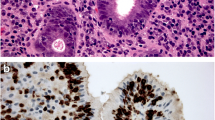Abstract
Familial adenomatous polyposis (FAP) is a rare genetic disease characterised by the development of hundreds to thousands of adenomatous polyps along the colon–rectum leading to cancer at a young age, if left untreated. In 1991, the gene responsible for the vast majority of FAP cases, the adenomatous polyposis coli (APC) gene, was identified. In 5–30% of FAP patients, no APC mutation is identifiable by current genetic testing. In 2003, it was shown that ‘APC-negative’ FAP patients may carry biallelic mutations in a different gene, the MYH gene. Genetics of FAP will be discussed in relation to its present clinical applications. If the hereditable mutation(s) is/are known in a family, it is possible to plan endoscopic surveillance only for those who actually inherited the mutation(s). Also, genetic testing may be of help in the diagnosis of atypical adenomatous polyposis cases and in the clinical management of affected individuals.




